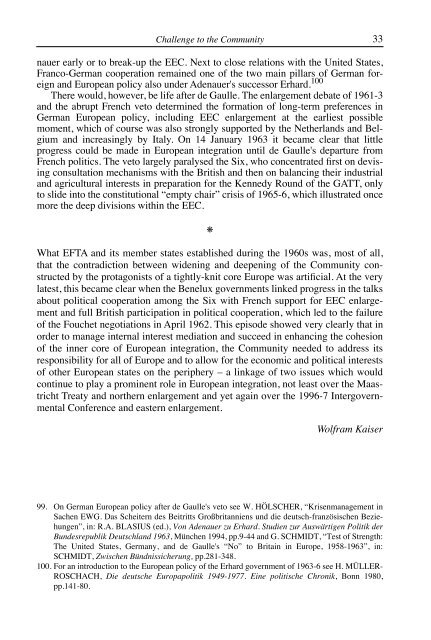32Wolfram Kaisersmaller coalition partner since 1961, but also the clear majority <strong>of</strong> the CDU itself.Contradicting sceptical public remarks by A<strong>de</strong>nauer on British EEC entry, theExecutive Committee <strong>of</strong> the CDU Parliamentary Party in the Bun<strong>de</strong>stag issued astatement in August 1962 which un<strong>de</strong>rlined their support for enlargement. 95 Thepolitical reasoning <strong>of</strong> the ageing Chancellor, who showed no interest in the economics<strong>of</strong> integration, seemed as much out <strong>of</strong> place as Macmillan's comparisonsduring 1958-60 <strong>of</strong> the Community with Napoleon's continental blocka<strong>de</strong>. A<strong>de</strong>nauer'shistorically motivated key argument against enlargement was revealed during aheated Cabinet discussion on 8 August 1962. At this meeting Lahr gave an overview<strong>of</strong> the state <strong>of</strong> the entry negotiations. When he criticized French obstructionpolicy, A<strong>de</strong>nauer explo<strong>de</strong>d and stated:“Han<strong>de</strong>lsabkommen [wer<strong>de</strong>n] hinter politischen Fragen zurückstehen. Die politischeFrage ist für uns nicht das Verhältnis zwischen uns und England, son<strong>de</strong>rn zwischenuns und Frankreich. Denn nur wenn Frankreich und wir so fest zusammenhalten, daßwe<strong>de</strong>r eine französische Regierung es unternehmen kann, gegen Deutschland einenVertrag mit Sowjetrußland zu schließen, noch eine <strong>de</strong>utsche Regierung es unternehmenkann, einen Vertrag mit Sowjetrußland gegen Frankreich zu schließen, könnenwir annehmen, daß (...) dieser politische Damm in Europa wirklich hält. (...) Es han<strong>de</strong>ltsich (...) darum, wer bis auf weiteres die Führung in Europa haben soll. Daß wirsie nicht beanspruchen können, das ist wohl klar; nach alle<strong>de</strong>m, was in <strong>de</strong>n letzten20, 30, 40 Jahren geschehen ist, kann das nicht eintreten. Die führen<strong>de</strong> Rolle inEuropa wird Frankreich o<strong>de</strong>r England haben. (...) Wenn die bei<strong>de</strong>n sich auf unseremRücken einigen könnten, wäre das das Schlimmste, was überhaupt passierenkönnte.” 96Although there was little enthusiasm in the Fe<strong>de</strong>ral Republic for British policyover Berlin, NATO or stationing costs <strong>–</strong> to name but a few contentious issues - 97 fewagreed with A<strong>de</strong>nauer's intellectual construction <strong>of</strong> a simple alternative betweeneither French or British lea<strong>de</strong>rship <strong>of</strong> Western Europe. Just how marked the consensuson the <strong>de</strong>sirability <strong>of</strong> enlargement was by then, became clear over <strong>de</strong> Gaulle'sveto <strong>of</strong> 14 January 1963 which showed how little the French Presi<strong>de</strong>nt cared for theinterests <strong>of</strong> the other Five in the EEC. After the veto the CDU did not start a revoltagainst A<strong>de</strong>nauer, who anyhow left <strong>of</strong>fice later that year. 98 They also ratified theFranco-German Elysée Treaty, conclu<strong>de</strong>d only two weeks after the veto, albeit withthe Atlantic preamble which ma<strong>de</strong> it largely meaningless. 99 The general preferencefor enlargement did not suffice for the government or the CDU to rid itself <strong>of</strong> A<strong>de</strong>-95. “England muß beitreten”, Die Welt, 23 August 1962.96. BA B 136/2561 (8 August 1962).97. On Anglo-German relations over Berlin see S. LEE, “Die zweite Berlin-Krise: Deutsch-britischeBeziehungen und die Neu<strong>de</strong>finierung internationaler Bindungen”, in: G. SCHMIDT, ZwischenBündnissicherung und privilegierter Partnerschaft: Die <strong>de</strong>utsch-britischen Beziehungen und dieVereinigten Staaten von Amerika 1955-1963, Bochum 1995, pp.81-139. On the financially importantand psychologically interesting issue <strong>of</strong> stationing costs see W. KAISER, “Money, Money,Money: The Economics and Politics <strong>of</strong> the Stationing Costs, 1955-1965”, in: ibid., pp.1-31.98. A<strong>de</strong>nauer's tacit support for <strong>de</strong> Gaulle's veto only accelerated the <strong>de</strong>cline <strong>of</strong> his authority within hisgovernment and the CDU. Cf. H.-P. SCHWARZ, A<strong>de</strong>nauer. Der Staatsmann: 1952-1967, Stuttgart1991, pp.826-39; H. KÖHLER, A<strong>de</strong>nauer. Eine politische Biographie, Berlin 1994, pp. 1206-21.
Challenge to the Community 33nauer early or to break-up the EEC. Next to close relations with the United States,Franco-German cooperation remained one <strong>of</strong> the two main pillars <strong>of</strong> German foreignand <strong>European</strong> policy also un<strong>de</strong>r A<strong>de</strong>nauer's successor Erhard. 100There would, however, be life after <strong>de</strong> Gaulle. The enlargement <strong>de</strong>bate <strong>of</strong> 1961-3and the abrupt French veto <strong>de</strong>termined the formation <strong>of</strong> long-term preferences inGerman <strong>European</strong> policy, including EEC enlargement at the earliest possiblemoment, which <strong>of</strong> course was also strongly supported by the Netherlands and Belgiumand increasingly by Italy. On 14 January 1963 it became clear that littleprogress could be ma<strong>de</strong> in <strong>European</strong> integration until <strong>de</strong> Gaulle's <strong>de</strong>parture fromFrench politics. The veto largely paralysed the Six, who concentrated first on <strong>de</strong>visingconsultation mechanisms with the British and then on balancing their industrialand agricultural interests in preparation for the Kennedy Round <strong>of</strong> the GATT, onlyto sli<strong>de</strong> into the constitutional “empty chair” crisis <strong>of</strong> 1965-6, which illustrated oncemore the <strong>de</strong>ep divisions within the EEC.❋What EFTA and its member states established during the 1960s was, most <strong>of</strong> all,that the contradiction between wi<strong>de</strong>ning and <strong>de</strong>epening <strong>of</strong> the Community constructedby the protagonists <strong>of</strong> a tightly-knit core Europe was artificial. At the verylatest, this became clear when the Benelux governments linked progress in the talksabout political cooperation among the Six with French support for EEC enlargementand full British participation in political cooperation, which led to the failure<strong>of</strong> the Fouchet negotiations in April 1962. This episo<strong>de</strong> showed very clearly that inor<strong>de</strong>r to manage internal interest mediation and succeed in enhancing the cohesion<strong>of</strong> the inner core <strong>of</strong> <strong>European</strong> integration, the Community nee<strong>de</strong>d to address itsresponsibility for all <strong>of</strong> Europe and to allow for the economic and political interests<strong>of</strong> other <strong>European</strong> states on the periphery <strong>–</strong> a linkage <strong>of</strong> two issues which wouldcontinue to play a prominent role in <strong>European</strong> integration, not least over the MaastrichtTreaty and northern enlargement and yet again over the 1996-7 IntergovernmentalConference and eastern enlargement.Wolfram Kaiser99. On German <strong>European</strong> policy after <strong>de</strong> Gaulle's veto see W. HÖLSCHER, “Krisenmanagement inSachen EWG. Das Scheitern <strong>de</strong>s Beitritts Großbritanniens und die <strong>de</strong>utsch-französischen Beziehungen”,in: R.A. BLASIUS (ed.), Von A<strong>de</strong>nauer zu Erhard. Studien zur Auswärtigen Politik <strong>de</strong>rBun<strong>de</strong>srepublik Deutschland 1963, München 1994, pp.9-44 and G. SCHMIDT, “Test <strong>of</strong> Strength:The United States, Germany, and <strong>de</strong> Gaulle's “No” to Britain in Europe, 1958-1963”, in:SCHMIDT, Zwischen Bündnissicherung, pp.281-348.100. For an introduction to the <strong>European</strong> policy <strong>of</strong> the Erhard government <strong>of</strong> 1963-6 see H. MÜLLER-ROSCHACH, Die <strong>de</strong>utsche Europapolitik 1949-1977. Eine politische Chronik, Bonn 1980,pp.141-80.
















